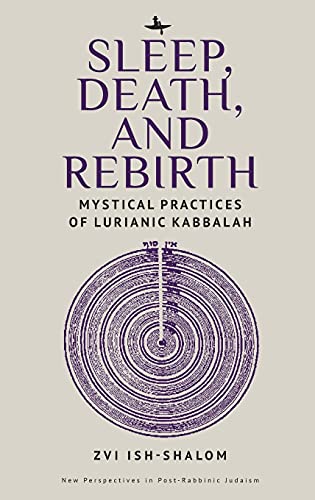Sleep, Death, and Rebirth: Mystical Practices of Lurianic Kabbalah (New Perspectives in Post-Rabbinic Judaism)
Authors
Zvi Ish-ShalomSynopsis
Product Description \\nIn the sixteenth century, the famous kabbalist Isaac Luria transmitted a secret trove of highly complex mystical practices to a select groups of students. These meditations were designed to capitalize on sleep and death states in order to effectively split one’s soul into multiple parts, and which, when properly performed, permitted the adept to free oneself from the cycle of rebirth. Through an in-depth analysis of these contemplative practices within the broader context of Lurianic literature, Zvi Ish-Shalom guides us on a penetrating scholarly journey into a realm of mystical teachings and practices never before available in English, illuminating a radically monistic vision of reality at the heart of Kabbalistic metaphysics and practice.\\nReview
\n“In Sleep, Death, and Rebirth, Zvi Ish-Shalom offers us an intricately researched, brilliantly dissected, expansively theorized, and elegantly constructed study of Lurianic cosmology and its interface with contemplative practice.”
\n―Shaul Magid, Distinguished Fellow in Jewish Studies, Dartmouth College (from the Preface)\\n“Paradoxically, Lurianic Kabbalah is the most widely circulated and yet the most inaccessible form of Jewish mysticism. There is no way in, one has to study it all and then figure it out. Zvi Ish-Shalom’s study of Lurianic soul theory is both careful and brazen, revealing secrets and addressing this spirituality with complete command of the system and also a bracing clarity. A bold aspect of this practice is its frank accessing of the soul and its reincarnation, the idea that the kabbalist can insert themself into the processes of death and rebirth. Zvi Ish-Shalom has mastered the texts, the scholarly analyses and, importantly, the cross-cultural and theoretical studies that must be brought to bear on any discussion of this esoteric practice. In so doing, he fulfills his stated mission of writing ‘a work of scholarship in the tradition of Western academia and/or as a literal/literary extension of the mystical tradition of Isaac Luria.’”
\n―Rabbi Pinchas Giller, Professor in Medieval Thought, American Jewish University\\n“With this new volume, Ish-Shalom provides new insight into the vast and understudied world of Lurianic Kabbalah. With simultaneous accessibility and rigor, his analysis of contemplative exercises associated with sleep in the Lurianic corpus reveals a productive tension between dualism and monism. This important new study considers the paradoxes inherent in the processes of the deconstruction and fragmentation of the soul and escape from the cycle of rebirth in Lurianic Kabbalah. Ish-Shalom’s insightful analysis casts new light on these texts and calls into question dichotomies that have long been considered essential to this mystical system. This study also advances a reconsideration of the distinction between primary and secondary modes of writing, and suggests a middle path that blurs scholarly analysis and the kabbalistic text without undermining the integrity of each. A must-read for anyone interested in Kabbalah studies, mystical literature, or Jewish thought.”
\n―Dr. Hartley Lachter, Associate Professor and Chair of Religion Studies, Lehigh University\\n“In this bold study, Zvi Ish-Shalom takes the reader along on the surprising adventures of sleep and dreaming in the notoriously complex tradition of Lurianic kabbalah. Few scholars have had the temerity to plunge into the labyrinthine teachings of Isaac Luria and pursue book-length studies. Fewer yet have employed deconstructive strategies as a way of actually participating in the Lurianic tradition, adopting both emic and etic (internal kabbalistic and external academic) methodologies to explain the motives, techniques, and effects of these nocturnal strategies for changing oneself and the cosmos. Treating Lurianic myth as story or fiction provides the non-traditional reader the distance to participate in the author’s process of interpretation, ultimately
Publisher:
Academic Studies Press
Pages:
192
Date Published:
2021-08-17
